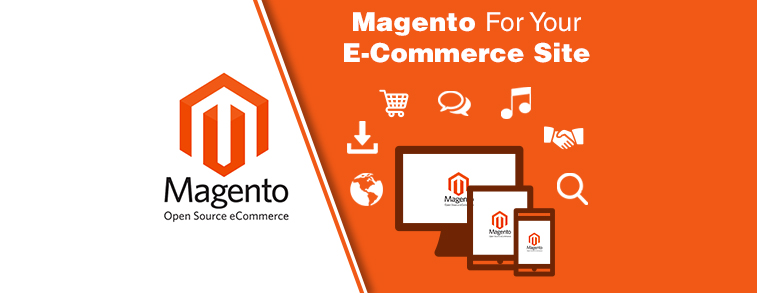5 Reasons to Choose Magento For Your E-Commerce Site


5 Reasons to Choose Magento For Your E-Commerce Site
Whether you’re creating a new web store or migrating to a new e-commerce service it can be difficult to find the right solution that meets your business’s needs. Magento is the leading e-commerce platform today and is used in about 20% of all e-commerce stores. It currently is the fastest growing e-commerce platform.
Magento has three frame works to meet the requirements of e-commerce stores, Magento Community, Magento Go and Magento Enterprise. Community is the first platform developed, and it was created as an open-source software so that developers can customize it to each store’s needs. Magento Go is meant for novices, designed as Software as a Service (SaaS). Magento Enterprise is meant for the larger e-commerce stores, enterprise edition offers more services, more optimized solutions.
-
Marketing: Marketing has been made effortless in Magento Development. Banners, promotions and discounts can be easily and quickly created. In the admin panel of the store, you can handle functions like- offering customers a percentage discount off of the total sales over a certain amount or providing an incentive like buy one, get one free.
-
Extensive Feature Set: Magento supports a plethora of features. Some of the great features are- setting up customer groups, address groups, attributes and ability to configure price rules. The feature set of Magento is more streamlined and intuitive as compared with the other platforms. It also allows a high degree of front and back end customization which allows great branding and service. An easily customizable platform is a natural result of having a large open source community. As more and more businesses adopt the Magento platform, more and more features are being developed to suit the demands of e-commerce retailers.
-
Large community and Plenty of Resources: Magento is an open-source platform, which means that thousands of developers from around the globe are simultaneously working to make it bigger, better and even more customizable. This results in a cost-efficient solution and it also provides a higher grade of quality for the product, since the collaboration of thousands of people are in a better position to catch bugs and find solutions than just a few people. Once Magento has been set-up, you may have questions about its functionality. There are many available resources like the Magento site and numerous related blogs and forums. The partner community provides a variety of services and even add-ons if you require functionality that is not native to Magento.
-
SEO Friendly: Magento has Search Engine Optimization (SEO) features to help you optimize your site. Features like Magento’s Search Engine Friendly URL helps by auto-generating URL’s down to the Layered Navigation, sitemaps for search engine submissions and URL rewrites to specify the exact structure of a product page. Magento enables complete control over URL’s and meta information, so there is no need for generating site maps as it is done automatically.
-
Custom Modules: Magento allows custom modules to be added to the framework without in any way interfering with the source code. This makes it so that all Magento updates will run smoothly without breaking on each update. Custom modules can be anything from syncing in-store Point Of Sales (POS) system to their web store’s inventory to creating a web store inside of a social media page. Companies of all sizes are migrating towards Magento because of its simplicity and it’s rich customizable features making it a great e-commerce platform.
Category: Digital
Recent Posts
-
GenAI & Data Engineering
From ‘Back-Office’ to ‘The Heart of the Business’
-
GenAI & Data Engineering
Aress OrderIt: Building an Intelligent Quick Commerce Delivery Platform with AI-Powered Optimization
-
24x7 Technical Support
Top 10 MSP Trends Driving Scale, Security, and Profitability in 2026
-
GenAI & Data Engineering
The 2026 Blueprint: 4 Pillars of Effective Cloud Data Management
-
Digital
Why Traditional QA Audits Fail at Scale in Contact Centers
 +91 253 6630710
+91 253 6630710 781.258.1274
781.258.1274 +44 (0) 7446 87 37 97
+44 (0) 7446 87 37 97